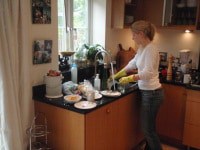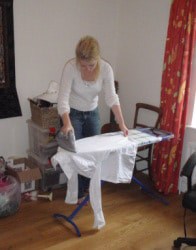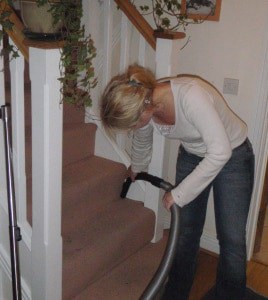Cleaning is a varied and flexible job that requires performing cleaning of different kinds within households or businesses, and may include both domestic tasks, such as hoovering and ironing, or more commercial operations, such as carpet or window cleaning.
Cleaners work to make domestic and commercial premises clean, tidy and safe.
They help people by completing various useful duties and facilitating their daily routines.
Although the domestic side of the industry is largely female-dominated the commercial side is more balanced and the profession in general is flexible, both in terms of the hours worked and the age of employees.
Cleaning is usually conducted indoors and there is a low level of technical, dangerous or complicated work or equipment to deal with.
Salary
Domestic cleaning roles usually operate on an hourly wage, which depends on the area, client and duties required, but usually ranges from a minimum of around £6.00 up to as much as £15.00.
Starting wages for employees in full-time commercial cleaning also start around the £6.00 mark, although many employers offer overtime for those working unsociable hours (calculated at around 50% extra).
In order to find work, many cleaners operate through cleaning agencies.
These agencies are useful for finding work for cleaners as they are able to spend more on their marketing and promotion, and can also build a solid reputation and public profile.
However, they do take a percentage commission, charging around £15.00 to the customer and passing on a little less than this to the cleaners themselves.
Responsibilities
Job responsibilities will often vary day-to-day, but the most common cleaning tasks include making beds, washing-up, hoovering, ironing, dusting, wiping surfaces and polishing furniture or windows.
Cleaners are expected to clean all the rooms in a house or workplace, including bathrooms and toilets.
Cleaners of business premises will be expected to clean office spaces, empty rubbish bins and prepare working areas for the next day.
This may involve cleaning out of normal working hours, sometimes late at night or early in the morning.
Qualifications
Because cleaning is considered unskilled work, no specific qualifications are required for domestic cleaning as such, but within commercial cleaning operations career progression can be achieved through different NVQ qualifications.
The most popular qualifications are the Cleaning NVQ Level 1 and Cleaning NVQ Level 2, awarded by City and Guilds and nationally recognised.
These courses are delivered in the workplace by B-Skill Assessors with a minimal disruption of normal work.
This is the most common cleaning qualification.
Alternatively, the Cleaning Operators Proficiency Certificate (COPC), awarded and moderated by the British Institute of Cleaning Science (BICSc), or the Food Premises Cleaning Certificate (FPCC), awarded and moderated by the British Institute of Cleaning Science (BICSc) are both nationally recognised within the cleaning industry, and offer greater specialisation.
It is also possible to become a cleaning supervisor by taking a higher-level NVQ course, or if you want to track your training and progress you can do so with a Pathway Card, which will help you demonstrate your commitment and progress to future and current employers.
More information about these qualifications can be found at the Asset Skills, British Institute of Cleaning Sciences, Directgov and Pathway Card websites:
Asset Skills
Helpline: 08000 567160
Asset Skills
British Institute of Cleaning Science (BICS)
Tel: 01604 678710
British Institute of Cleaning Science
It is important to note that although no formal cleaning qualifications are required for domestic cleaning, entry to a property is required to perform cleaning duties, and trust is therefore a major issue within the industry.
Many companies and agencies vet their employees carefully and self-employed or freelance cleaners will have to work hard to establish a network of trusting clients through local advertising and word-of-mouth.
For these reasons young males may find it difficult to start an independent cleaning service, and many cleaners tend to be females in their mid-twenties and above.
Reliability is also of key importance, especially in commercial cleaning where businesses need their premises to be clean for the next day’s operations.
Skills
Honesty and a sense of responsibility are important in building and maintaining a client base.
Hard work, patience and a thorough approach are also desirable to ensure that tasks are performed to a standard satisfactory to the client.
Self-motivation and a reasonable level of physical fitness are also important.
Working conditions

With the exception of window cleaning, most cleaning jobs operate under cover and often within domestic residences.
This means that working conditions can usually be expected to be warm, dry and reasonably comfortable.
Perks may include snacks such as biscuits or refreshments (tea, coffee etc.) but as the work is often casual, standard benefits such as sick pay, holiday pay, pension schemes and so on are rare within the domestic side of the industry.
However, unsociable hours are often required (although they are usually better-paid), and cleaning almost always extends to toilets and bathrooms which may be unhygienic and require chemical cleaning aids or protective equipment such as gloves or face-masks.
Employers
Most cleaners operate on a freelance basis or through a local agency so the number of large domestic cleaning services is small.
Similarly, most commercial cleaning firms operate on a regional basis, and therefore the number of nationwide employers is much smaller than in other industries, although there are some, including: Superclean and Bush Brush Cleaners.
More information can be found through the website addresses below:
Career progression
There is not much opportunity for domestic cleaners to increase their earnings above a certain threshold as the work is largely unskilled and people generally seek to employ cleaners in a flexible, part-time capacity.
Commercial cleaning has more scope for advancement, and additional qualifications (see above) or specialisation in more difficult cleaning operations (carpet, upholstery or environmental cleaning, for example) can bring greater financial rewards.
By completing NVQ qualifications it is possible to become a supervisor and then to train new cleaners.
With further experience a supervisor can become a cleaning manager.
Becoming an employer by establishing a cleaning business or cleaning agency is the ultimate way to increase earnings and provide stable income, but this requires greater experience and investment.
Image

Also known as…
- Maid
- Janitor
- Housekeeper
Related Jobs
What’s it really like?
Julia, 27, working in Oxford has been cleaning for nearly 2 years.
Why did you choose cleaning?
After I finished university I wanted to continue living in Oxford and also to save some money to go abroad.
I found a local pub which needed a cleaner so I made an arrangement to clean the pub every morning in return for a room above the pub.
What does the job involve?
Each day is different but usually I wake up at around seven and clean the pub, which takes around an hour-and-a-half.
I then go to my first house and begin cleaning.
Each house wants different things.
Sometimes somebody is there so they can show me what they want me to do but other people leave me a list of things to do.
Most people want me to come when they are not in the house.
At other times, people just ask me to do what I can in a total amount of time, such as two hours.
In the first situation I work through a list in order.
Many people leave a pile of clothes for me to iron, or ask that I make the beds in the house.
In the second situation I start by walking around the house to see what needs to be done and what is most important.
I take all the dirty plates, mugs and glasses to the kitchen and put them in the sink or in the dishwasher.
I usually clean the kitchen first and bedrooms second because most people want a clean kitchen.
When I have finished washing and drying the kitchen equipment I clean the surfaces, including the food preparation areas and tables.
Then I move around the house, tidying and cleaning in the different rooms.
At the end of the job I make a list of what I did and leave a note to show what I completed or did not have time to do – I always keep a copy for myself so I can remember what money I need to receive and in case I forget.
Some people pay me every time I clean for them but other people pay me at the end of the month so it is important to keep a record of how much cleaning I did.
What do you like about the job?
I like the flexible hours and I enjoy making people’s houses nice for them – they are often nice to me and they trust me.
What do you dislike about the job?
I often have to clean dirty toilets and bathrooms, which I do not like.
For this I have to wear gloves and the smell can be disgusting.
Also, people sometimes leave lots of mess so I cannot finish the cleaning but they still expect me to complete what they ask me to do.
The job can sometimes be lonely as I am often working on my own.
Do you have any advice for prospective cleaners?
I think it is a good idea to advertise as much as possible in your local area.
I found many customers through the Gumtree website and local website called Daily Information.
I also put some adverts in my local newsagent but these were not as successful.
Other than that, try to be reliable and do a good job – people often give tips if you work hard and they trust you (they will also recommend you to their friends).










